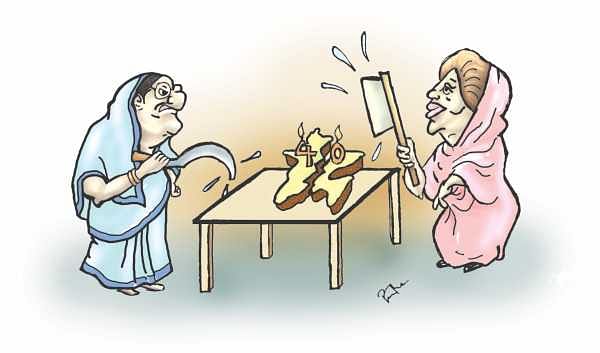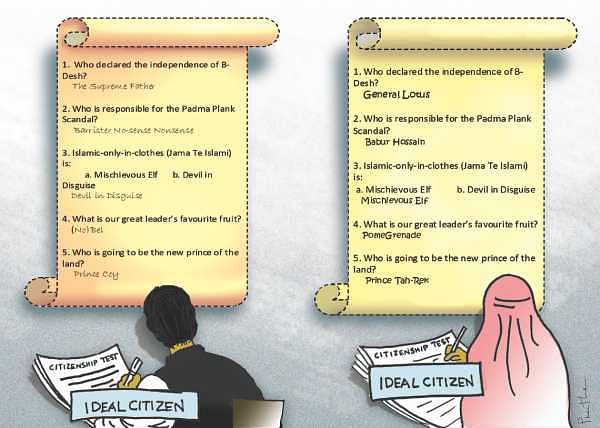| Home - Back Issues - The Team - Contact Us |
 |
| Volume 10 |Issue 49 | December 30, 2011 | |
|
|
The Great Divide Anika Hossain Thursday, December 25, 2021 Dukhi Mohfiz stares ruefully at the newspaper strewn on the cracked stool in front of him. Today's headline has confirmed his biggest fear. Queen Dolly Bee has announced the new visa requirements for The Kingdom of Khalediarabia. There goes my last hope of finding my beloved dog, he sighs. It has been two years since the great divide of B-Desh. Mohfiz remembers when it all happened. The enmity between Shaksina and Dolly Bee had been at its peak. Following the divide of its capital, The D-town, violent catfights were breaking out in the parliament daily, mandatory weekly elections were the only time people were allowed to leave their homes for more than an hour. All newspapers and electronic media in the country were banned. Every other day except Election Day was a hartal. You never knew when Shaksina, Dolly Bee or any of their loyal followers would visit your home to “convince” you to vote for them. When it became evident (following a mud wrestling match between the two on the parliament grounds, which received international media coverage) that things were indeed more out of control than usual, a group of referees stepped in to do some damage control. After months of bickering (and another hair pulling match), it was finally decided that B-Desh would be divided into two, and Shaksina and Dolly Bee would each receive their very own country to do with what they liked.
The fault line was established right across the heart of D-town. A coin toss decided that Shaksina would be bequeathed the southern portion of the country, which she gleefully named Hasinabaad and a disappointed (to say the least) Dolly Bee would rule over the north—The Kingdom of Khalediarabia. The two ladies promptly named themselves queens and set up court in their respective kingdoms and from that moment on, life was never the same for the common people of B-Desh. All citizens and animals had to move back to their villages/towns of origin. Families were separated as husbands and wives from different parts of the country parted ways. That is how Mohfiz lost his dog. As he recalls these events, Mohfiz once again looks down at the new list of requirements. It reads, “All Hasinabaadians hoping to receive a visa must pay an amount no less than 200,000 Zias as entrance fees, along with the updated visa forms (50 pages both sides), they must also submit their 5th grade report cards (no exceptions), the birth certificate of their great grandmother's brother's/sister's nieces/nephews. Along with these documents, they must submit a lock of hair of their relatives (if any) residing in Khalediarabia for DNA testing. All applicants must present ten French chiffon saris, which they have made themselves (photographic proof required) to Queen Dolly Bee. Applicants must also have visas to all Middle Eastern countries in their current passport. Visas will be denied to any applicant who has an Indian visa on their passport.” How am I supposed to manage all that, thinks Mohfiz to himself. He recalls when his wife had sent him her last letter from Khalediarabia explaining why she was re-marrying. She said that to enter Hasinabaad, you had to come up with one great idea to digitalise something, make a sizeable donation to the Digital Hasinabaad cause (in the amount no less than 600,000 Sheikhs), you also had to prove that you were in no way shape or form related to any 'noble l'oreate', anywhere in the whole world. Who can blame her? Mohfiz thinks to himself. His wife had taken their children with her, which in hindsight is probably a good thing, Mohfiz reflects. In Hasinabaad, all schools, hospitals and government offices have been digitalised (or so Shaksina says). In order to receive an education or healthcare, one has to own a computer and have Internet connection. Since most citizens of Hasinabaad spend 98% of their income on taxes that are used to digitalise the country, noone has money to buy computers (or even pay their bills). So the children are probably better off with their mother. Even though Queen Dolly Bee has abolished all English and Bengali medium schools, the Madrasas that have replaced them are—well they are tangible at least. As Mohfiz sips his cup of hot limewater, he tries not to crave for tea. Those days are gone, there are no tea estates in Hasinabaad, and the Queens have banned all trade between the two countries. His wife used to mail him some, but that too had been discovered and banned. He decides to cheer himself up by visiting his friend, Sentu Bhai, who lives two roads down from him, on The Supreme Father Avenue, right beside The Supreme Father Bakery across from The Supreme Father Russian Cultural Centre and The Supreme Father Field. He has a supreme view of The Supreme Father Lake, from his balcony.
Wearing his black Baba coat, which is now the national uniform (it is against the law to leave one's home without it) Mohfiz sets off on his boat, which is now the mandatory mode of transport in the country. As there is no water in Hasinabaad, (Dolly Bee is hogging all the river water), all boats now move on wheels. Inevitably, a journey which should have taken two minutes extends to an hour as Mohfiz is stuck in the usual traffic jam on the broken and potholed main road. A boat is half stuck in a gaping hole, which was once a sidewalk, blocking the entire road. Who has time or money to fix roads when there is a country to be digitalised? Shaksina had said in her last speech at court. Sentu Bhai had been waiting for his friend with a cup of seawater. While Mohfiz enjoys his visits to Sentu's house immensely, there is just one problem, located at the fault line, half of Sentu's house, more importantly, the half that contains the bathroom, is a part of The Kingdom of Khalediarabia and therefore inaccessible without a visa. Sentu's repeated pleas to Shaksina to build a new bathroom on the Hasinabaad side of his house had fallen on deaf ears. Shaksina maintained that since Hasinabaadians were allowed to use the bathroom only twice a day (imported water from India is expensive), “there is no point in adding one more to a country already overcrowded with bathrooms.” Saving his bathroom trip for later (with difficulty), Mohfiz chats about the political situation in both countries with his friend. Sentu has heard that Queen Dolly Bee had emptied out the treasury a few months ago, to add to the height of the already 100 ft high Great Wall of Tah-Rekh, which she has built around her kingdom like a fortress. Sentu's 75-year-old mother lives alone in Khalediarabia, and he often attempts to climb over the wall to see her. Lately though, the armed guards standing atop the wall put an end to his attempts. A disappointed, Sentu talks of his plans to join the mass uprising of the tribal population living in Hillgong. These folks had declared their independence six months ago and formed a guerilla army to fight against Queen Shaksina's troops. Shaksina had never been in favour of granting them citizenship, infact, she had tried her best to convince them all that they had come from Colourville up north, and bore resemblance to Dolly Bee, but this just made matters worse. The two friends are also concerned about the refugees now in hiding at the former parliament building located in D-town. These consist of people who have no idea as to where their village of origin is, and are therefore denied citizenship in either country. The parliament building and grounds had been declared “No Man's land,” about a year ago and no one paid much attention to it until recently, when Dr No-Bel, Shaksina's arch enemy, was spotted there giving a lecture on micro-bartering. The building is now under surveillance by Shaksina's troops as No-Bel is number one on the most wanted list in Hasinabaad. That is not the end of it. When the Ashundor Bans and the Beach City were declared the eighth and ninth wonders of the world for being the world's first jungle without trees or animals and the dirtiest beach in the world respectively, Dolly Bee lost her temper. She had always wanted the southern regions of B-Desh. She felt cheated and rumour has it, that she will not sit back and take it. Yes, Queen Dolly Bee is raising an army of her own, to launch an attack on Hasinabaad. Her suggestion to switch countries every five years (in hope that she can some day reclaim her home in Cantarment, now known as The Supreme Father Cantarment) has been rejected and she is ready to unleash her wrath. As Dukhi Mohfiz and Sentu Bhai contemplate their futures while looking at Sentu's mom's photo in a pink burkha (national uniform of Khalediarabia), they are serenaded by the sound of Shaksina's melodious (?) voice. She has finally released that music album which has been her dream since childhood, and it is now the law of the land, for everyone to listen to her songs from 7pm to 9pm on weeknights, and 9pm to 12am on weekends. As they sit idly, staring at the murky waters of the Supreme Father Lake, enjoying the few hours of the day when there is electricity, they wonder what they can cook for dinner, without gas. Yes, life has changed, but not for the better, not for them at least. They both think wistfully of a united B-Desh, and life as it once was, before the great divide of the infamous D-town.
Copyright
(R) thedailystar.net 2011 |

